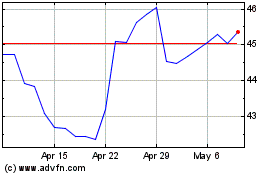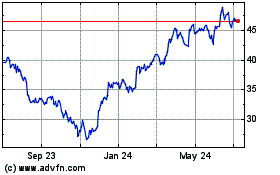Peugeot Steers Opel Into Electric Cars -- WSJ
November 10 2017 - 3:02AM
Dow Jones News
By William Boston
This article is being republished as part of our daily
reproduction of WSJ.com articles that also appeared in the U.S.
print edition of The Wall Street Journal (November 10, 2017).
RÜSSELSHEIM, Germany -- The maker of Peugeot on Thursday
unveiled a sweeping restructuring plan for its Opel and Vauxhall
units aimed at pushing into electric cars and finally turning a
profit at the recently acquired brands within two years.
The overhaul marks the next step in the turnaround for PSA
Group, which also manufactures the Citroën brand. The French car
maker was rescued from near bankruptcy in 2013 through a bailout
from the French government and Chinese state-owned Dongfeng
Motors.
Over the past three years, PSA has become one of Europe's most
profitable companies as Chief Executive Carlos Tavares has tried to
build Peugeot into a global competitor to Volkswagen AG, General
Motors Co. and Toyota Motors Co.
Peugeot acquired Opel and its British unit Vauxhall from GM in
August for $2.2 billion, after GM threw in the towel following
years of losses and failed attempts to wean them back to
health.
"Over the past 15 years this company has lost more than $10
billion. This company has cut more than 30,000 jobs. This is a
fact. We face a dramatic situation," Mr. Tavares told reporters at
Opel's headquarters in Rüsselsheim.
If Mr. Tavares succeeds where GM failed, the restructuring could
become a watershed for the European auto industry, which still
suffers from low profits and overcapacity as growth in European
new-car sales slows, and transform Peugeot into a potent rival to
Volkswagen.
The restructuring plan, thrashed out in over three months of
tense meetings, targets annual savings of EUR1.1 billion ($1.3
billion) and a profit margin of 2% by 2020. By 2026, those targets
are forecast to increase to EUR1.7 billion in savings and a 6%
profit margin.
Opel's management doesn't plan to achieve the savings through
plant closures or mass layoffs, said Opel Chief Executive Michael
Lohscheller. He said labor costs needed to come down, but that
could be achieved through early retirement and other measures,
declining to elaborate on any details.
Mr. Tavares is aiming to nurse Opel and Vauxhall back to profit
by accelerating plans to shift production to the French car maker's
technology, allowing the larger car group to cut costs by building
Peugeot, Citroen, Opel and Vauxhall models with the same equipment
and parts.
Mr. Lohscheller said savings would be achieved through
long-overdue streamlining "just like PSA did" that includes
reducing the number of engine groups to four from 10 and cutting
the model technology platforms to two from nine.
Opel is targeting substantial savings in manufacturing,
purchasing, and management, aiming to reduce costs per car by
EUR700 by 2020 with the aim of reducing the break-even point to the
sale of 800,000 cars. The executives didn't say where break-even is
now.
Producing Opel and Vauxhall models on Peugeot technology will
help cut the number of components used by half. Opel isn't planning
to shut any plants, but it will reduce the size of their
manufacturing operations by 25% and will boost capacity usage in
Germany by moving production from South Korea.
Until now, Opel has only had one electric vehicle, the Ampera-E.
Without additional electric-car models, Opel has been on a
trajectory to exceed European greenhouse-gas emission targets in
2020. Under the new plan, Opel will begin churning out electric and
hybrid versions of its models. Every model the company makes will
have an electric version by 2024.
"They were able to rebuild the product planning in a short
period of time to put the CO2 strategy back on track," Mr. Tavares
said.
Under GM's leadership, Opel neither exported its products nor
expanded into other markets where GM was present. That will also
change under Peugeot's tutelage. Mr. Lohscheller said Opel has
identified up to 20 markets that the company plans to enter in the
coming years. He declined to elaborate much, but cited Argentina,
Saudi Arabia and Taiwan.
Mr. Tavares's best argument for the potential success of his
plans for Opel is his record at Peugeot. When he began in 2014,
Peugeot's factories were working well below capacity and bleeding
cash. Last month, he said, Peugeot's factories worked at 130%
capacity.
Opel is the next steppingstone for Mr. Tavares to achieve his
global ambition.
"Being a strong champion in Europe gives us a very strong basis
from which we can leverage more profitable growth overseas," he
said. "You cannot be a strong global leader if you are not strong
in your home market."
--Max Bernhard contributed to this article.
Write to William Boston at william.boston@wsj.com
(END) Dow Jones Newswires
November 10, 2017 02:47 ET (07:47 GMT)
Copyright (c) 2017 Dow Jones & Company, Inc.
General Motors (NYSE:GM)
Historical Stock Chart
From Mar 2024 to Apr 2024

General Motors (NYSE:GM)
Historical Stock Chart
From Apr 2023 to Apr 2024
